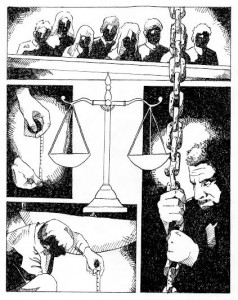On Nov. 9, 2013, the fate of Pleasant Grove doctor and BYU law graduate Martin MacNeill rested with a group of Utah County jurors.
To convict MacNeill, the jurors would need to prove beyond a reasonable doubt that he murdered his wife.
According to associate professor Shima Bardaran of the BYU Law School, beyond a reasonable doubt “is the highest standard of proof in law because our system respects the liberty of individuals,” she said. “In order to deprive someone’s liberty we must meet a high standard.”
The standard of beyond a reasonable doubt is well known in criminal law, but the principle can also be applied outside of the courtroom by individuals faced with tough decisions. Elements of this standard can be seen in counsel from church leaders, in making career and marriage decisions as well as in other facets of life both in and out of the realm of law.
“My dear brothers and sisters — my dear friends — please, first doubt your doubts before you doubt your faith,” Elder Uchtdorf said. “We must never allow doubt to hold us prisoner and keep us from the divine love, peace, and gifts that come through faith in the Lord Jesus Christ.”
Shortly after President Uchtdorf made this statement, memes and variations of this quote popped up all over the internet. Many students said this was one of the most memorable quotes from general conference.
“I think it hit home for a lot of people in the church who were having a hard time overlooking their doubts about gospel topics,” said 23-year-old BYU student Nathan Smith. “It’s a good reminder to not let the few things you don’t know diminish the many things that you do know.”
In the case of Martin MacNeill, the jury didn’t know for sure that MacNeill killed his wife. However, the defense didn’t present enough evidence to show that he was innocent, and as a result, the jury determined that he was guilty of murder.

“Martin MacNeill murdered his wife, Michele,” prosecutor Chad Grunander told jurors in his closing argument. “Her death was not the result of an accident, and it certainly was not the result of a heart condition. The defendant carried out a cold and calculated plan to murder his wife. He relied on his knowledge and experience as a doctor and also as a lawyer to accomplish this.”
At BYU, many students face similar tough decisions. These decisions may not be whether a person is guilty of murder or not, but may be about missions, marriage, majors and careers.
One BYU student, Josef Kujanpää, faced the decision of marriage and of taking a job offer in China at the same time.”I had one good job offer and the best girl I could dream of marrying, but logically it seemed that in order to choose one I would have to shun the other,” Kujanpää said. “I tried and tried to play it out in my head: how I could take the job and move to China, as well as marry the girl of my dreams? At the time, it seemed nearly impossible.”
After taking the advice of his home teachers and parents, Kujanpää decided to propose to his girlfriend two days before she left for Africa on a humanitarian trip. She accepted, and two weeks later he left to start his job in China. In September, the couple married and moved to China to begin their life together.
“I feel that because I worked through it all in my mind and in my heart and I knew that I was choosing good things, the Lord supported and blessed me for my efforts,” Kujanpää said.
In Kujanpää’s case, overlooking his doubts resulted in marriage and moving to another country. In Martin MacNeill’s case, it resulted in conviction of the murder of his wife. However, in 2012, another Utah jury applied the beyond a reasonable doubt standard and reached a very different conclusion. A jury in Spanish Fork concluded that prosecutors did not prove beyond a reasonable doubt that Roberto Miramontes Roman shot and killed Millard County deputy sheriff Josie Greathouse Fox on a rural highway outside Delta in January 2010.
In his testimony at trial, Roman told a surprising story, claiming that, in fact, Fox’s brother shot the deputy sheriff. Since Fox’s brother was deceased, the jury felt this testimony cast reasonable doubt on the prosecutors’ case and voted to acquit Roman.
“The jury didn’t believe there was enough other evidence to convict,” defense attorney Stephen McCaughey told journalists from the Deseret News after the trial. “The burden of proof was on the state. They put on a lot of evidence. It really didn’t show anything. It was just a lot of fluff.”
While the cases of Josie Greathouse Fox and Martin MacNeill had opposite outcomes, they both brought the standard of beyond a reasonable doubt into public awareness. These kinds of decisions arise in the courtroom frequently, but they also arise in our personal lives. With the light of the gospel, students are able to navigate through these tough decisions successfully.
“We never know the timing of the Lord, but we can all know that he has a plan for each and every one of us,” Kujanpää said. “As we strive to live Christ-centered lives, changing our lives daily so that we are striving to become more like our Savior, we will have the ability to make hard decisions, look past our doubts, and go forward with faith without fearing the outcome.”




